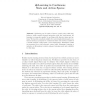Free Online Productivity Tools
i2Speak
i2Symbol
i2OCR
iTex2Img
iWeb2Print
iWeb2Shot
i2Type
iPdf2Split
iPdf2Merge
i2Bopomofo
i2Arabic
i2Style
i2Image
i2PDF
iLatex2Rtf
Sci2ools
AUSAI
1999
Springer
1999
Springer
Q-Learning in Continuous State and Action Spaces
Abstract. Q-learning can be used to learn a control policy that maximises a scalar reward through interaction with the environment. Qlearning is commonly applied to problems with discrete states and actions. We describe a method suitable for control tasks which require continuous actions, in response to continuous states. The system consists of a neural network coupled with a novel interpolator. Simulation results are presented for a non-holonomic control task. Advantage Learning, a variation of Q-learning, is shown enhance learning speed and reliability for this task.
Related Content
| Added | 03 Aug 2010 |
| Updated | 03 Aug 2010 |
| Type | Conference |
| Year | 1999 |
| Where | AUSAI |
| Authors | Chris Gaskett, David Wettergreen, Alexander Zelinsky |
Comments (0)

